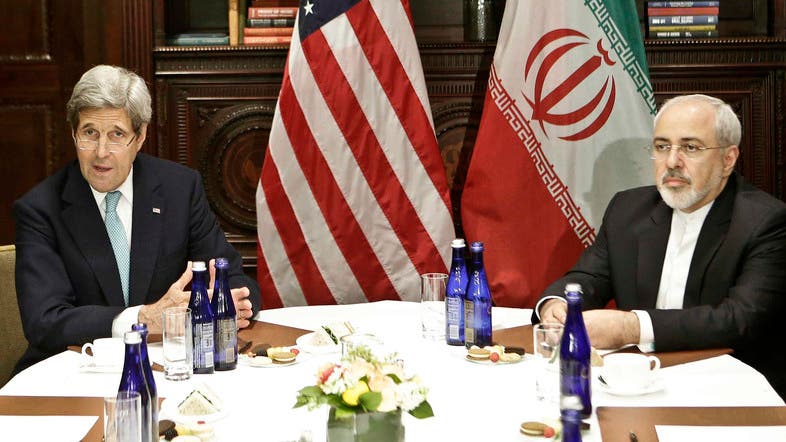
US Secretary of State John Kerry, left, speaks to the media as he
meets with Iranian Foreign Minister Mohammad Javad Zarif Friday, April
22, 2016, in New York. (AP)
Reuters, United Nations
Friday, 29 April 2016
Iran asked UN chief Ban Ki-moon on Thursday to convince the United
States to stop violating state immunity after the top US court ruled
that $2 billion in frozen Iranian assets must be paid to American
victims of attacks blamed on Tehran.
Iran’s
Foreign Minister Mohammad Javad Zarif wrote to Ban a week after the US
Supreme Court ruling, calling on the Secretary-General to use his “good
offices in order to induce the US Government to adhere to its
international obligations.”
Zarif’s appeal
comes amid increasing Iranian frustration at what they say is the
failure of the United States to keep its promises regarding sanctions
relief agreed under an historic nuclear deal struck last year by Tehran
and six world powers.
In the letter,
released by the Iranian UN mission, Zarif asked Ban to help secure the
release of frozen Iranian assets in US banks and persuade Washington to
stop interfering with Iran’s international commercial and financial
transactions.
“The US Executive branch
illegally freezes Iranian national assets; the US Legislative branch
legislates to pave the ground for their illicit seizures; and the US
Judicial branch issues rulings to confiscate Iranian assets without any
base in law or fact,” Zarif said.
Supreme
Leader Ayatollah Ali Khamenei’s top adviser Ali Akbar Velayati was
quoted by Iranian state media as saying that “Iran will never abandon
its right and will take any necessary action to stop such an
international theft.”
“This money belongs to Iran,” he said.
Ban’s
spokesman and the US mission to the United Nations did not immediately
respond to requests for comment on the letter or the accusations made
against the United States.
Zarif told Ban
he wanted to “alert you and through you the UN general membership about
the catastrophic implications of the US blatant disrespect for state
immunity, which will cause systematic erosion of this fundamental
principle.”
The US Supreme Court found
that the US Congress did not usurp the authority of American courts by
passing a 2012 law stating that Iran's frozen funds should go toward
satisfying a $2.65 billion judgment won by the US families against Iran
in US federal court in 2007.
“It is in
fact the United States that must pay long overdue reparations to the
Iranian people for its persistent hostile policies,” Zarif wrote, citing
incidents including the shooting of an Iranian civil airliner in 1988.
Last
week Zarif met several times with US Secretary of State John Kerry in
New York to discuss Iranian problems accessing international financial
markets.
Tehran has called on the United
States to do more to remove obstacles to the banking sector so that
businesses feel comfortable investing in Iran without fear of penalties.
Some
hardline lawmakers have called on the government of President Hassan
Rowhani to consider the ruling a violation of the nuclear deal reached
with the United States and other major powers in 2015.

No comments:
Post a Comment